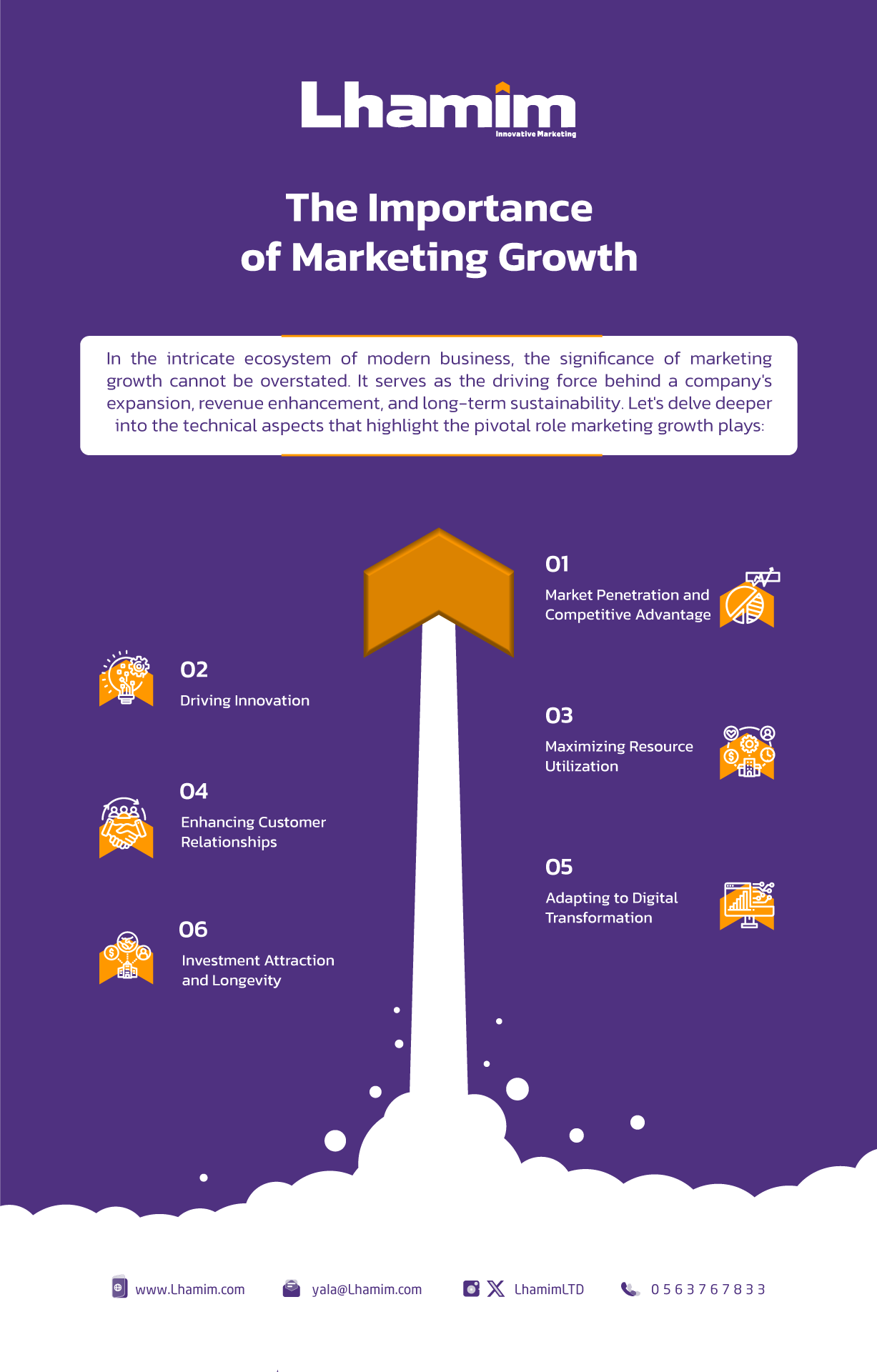Marketing growth is the bedrock of a company’s success. It propels market penetration, fosters innovation, optimizes resource utilization, enhances customer relationships, embraces digital transformation, and positions the company for longevity and investor attraction. Embracing the technical intricacies of marketing growth is not just a choice; it’s a necessity in navigating the complex world of modern business.

Understanding Marketing Growth
Defining Marketing Growth Marketing growth refers to the continuous process of expanding a business’s market share, customer engagement, and overall profitability. It involves strategic initiatives designed to drive brand awareness, increase sales, and foster customer loyalty.
The Importance of Marketing Growth In an era marked by fierce competition and changing consumer behaviors, achieving marketing growth is paramount. Businesses that stagnate risk losing relevance and market share to more agile competitors. An effective marketing growth strategy ensures long-term sustainability and adaptability to market shifts.
The Concept of Growth Hacking
Growth hacking is a dynamic and innovative approach to achieving rapid marketing growth. It involves creative and often unconventional strategies to engage users, boost brand exposure, and drive customer acquisition. Growth hacking prioritizes experimentation, data analysis, and iterative optimization.
Growth Hacking vs. Traditional Marketing While traditional marketing focuses on established strategies and channels, growth hacking thrives on experimentation and adaptability. Traditional marketing emphasizes long-term brand building, while growth hacking aims for quick, measurable results by leveraging digital tools, social media, and technology.

The Importance of Marketing Growth
In the intricate ecosystem of modern business, the significance of marketing growth cannot be overstated. It serves as the driving force behind a company’s expansion, revenue enhancement, and long-term sustainability. Let’s delve deeper into the technical aspects that highlight the pivotal role marketing growth plays:
– Market Penetration and Competitive Advantage
Marketing growth is essential for market penetration, allowing a company to establish its presence in new or existing markets. Through targeted strategies and increased visibility, a company can attract new customers while retaining existing ones. This endeavor not only contributes to revenue increase but also bolsters the competitive advantage.
By continually reaching new segments of the market, a company can diversify its customer base, reducing reliance on a single market segment. This diversification provides a cushion against market fluctuations, economic downturns, and changes in consumer preferences, thus enhancing the company’s resilience.
- Driving Innovation
Marketing growth often goes hand in hand with innovation. To stay ahead of competitors and capture new markets, companies need to innovate their products, services, and marketing strategies. This involves researching consumer needs, developing new solutions, and effectively communicating these innovations to the target audience.
Innovations can lead to disruptive breakthroughs that reshape industries, as seen with companies like Apple and Tesla. Such transformative innovations not only drive growth but also position the company as a market leader, fostering customer loyalty and brand recognition.
- Maximizing Resource Utilization
Efficient marketing growth requires optimizing resource allocation. Through meticulous analysis of market trends, customer behavior, and campaign performance, companies can allocate resources strategically. This data-driven approach ensures that marketing budgets are focused on high-impact activities, minimizing wastage and maximizing ROI.
Resource optimization also extends to human capital. With growth comes the need for skilled professionals across various domains, from digital marketing and data analytics to customer experience and branding. Effective utilization of these talents further fuels marketing growth through innovation and specialization.
- Enhancing Customer Relationships
Marketing growth is intricately tied to building and nurturing customer relationships. An increased focus on engagement, personalization, and exceptional customer experiences enhances brand loyalty and encourages repeat business.
With the advent of CRM (Customer Relationship Management) systems and advanced analytics, companies can gather detailed insights into individual customer preferences, purchase history, and engagement patterns. These insights empower businesses to tailor their marketing efforts, delivering the right message to the right audience at the right time.
- Adapting to Digital Transformation
In today’s digital landscape, marketing growth is synonymous with adapting to technological advancements. The rise of e-commerce, social media, and mobile platforms has transformed how businesses interact with consumers. Embracing digital channels not only expands reach but also opens up new avenues for data collection and analysis.
Digital transformation also enables real-time tracking of marketing campaigns, providing immediate insights into performance and allowing for quick adjustments. Agile marketing strategies based on digital insights lead to faster decision-making, greater adaptability, and increased chances of success in a rapidly evolving market.
- Investment Attraction and Longevity
Strong marketing growth attracts investors and stakeholders. A company showcasing consistent expansion and profitability becomes an attractive prospect for investors seeking returns on their investments. A solid growth trajectory indicates a well-executed strategy, a strong market position, and a potential for long-term sustainability.
Moreover, marketing growth is integral to a company’s longevity. Businesses that fail to adapt and grow often face stagnation and eventual decline. A proactive approach to marketing growth ensures the company’s relevance and endurance in a competitive landscape.

Strategies for Achieving Marketing Growth
- Data-Driven Decision Making Incorporating data-driven insights into your marketing strategy is essential. Analyzing customer behavior, preferences, and engagement metrics helps you tailor campaigns for maximum impact.
- Customer-Centric Approach Putting the customer at the center of your strategy enhances engagement and loyalty. Listen to customer feedback, address pain points, and create personalized experiences.
- Leveraging Social Media Harness the power of social media platforms to reach a global audience. Develop engaging content, run targeted ads, and interact with users to foster community.
- Content Excellence and SEO Quality content establishes your brand as an authority in your industry. Coupled with effective Search Engine Optimization (SEO), it improves your online visibility and organic search ranking.
- Referral Programs and Partnerships Encourage existing customers to refer new ones through well-designed referral programs. Collaborate with complementary businesses to tap into their customer base.
- Personalization and Customer Experience Tailor your marketing messages to individual preferences through personalized recommendations and emails. Exceptional customer experiences lead to repeat business and positive word-of-mouth.
Measuring and Analyzing Marketing Growth
Key Metrics for Tracking Growth Metrics such as customer acquisition cost, customer lifetime value, conversion rates, and churn rate provide valuable insights into your marketing effectiveness.
Utilizing Analytics Tools Leverage analytics platforms like Google Analytics and social media insights to track user behavior, website traffic, and campaign performance.
Overcoming Challenges in Marketing Growth
Market Saturation In crowded markets, differentiation is key. Find your unique value proposition and communicate it effectively to stand out.
Adapting to Technological Advancements Stay updated with technological trends like AI, automation, and voice search to remain relevant and leverage new channels.
Building a Resilient Brand Cultivate brand loyalty by consistently delivering on promises. Authenticity and transparency foster trust among consumers.
Conclusion
As technology continues to evolve, AI-driven personalization, immersive experiences, and sustainable practices will shape the future of marketing growth. Businesses need to adapt quickly to stay competitive.
In the dynamic landscape of modern business, marketing growth is not a luxury but a necessity. Embracing growth hacking principles, data-driven strategies, and customer-centric approaches will empower your business to thrive amidst challenges and capitalize on opportunities. Remember, the journey of marketing growth is ongoing—continuously analyze, iterate, and innovate to stay ahead in the ever-changing marketplace.
Our consultants work closely with companies to help growth. We know very well that it is a task that requires teamwork and the ability to work in different environments on projects with diverse goals and strategies, so you can be assured of achieving satisfactory results. Let’s get in touch.


